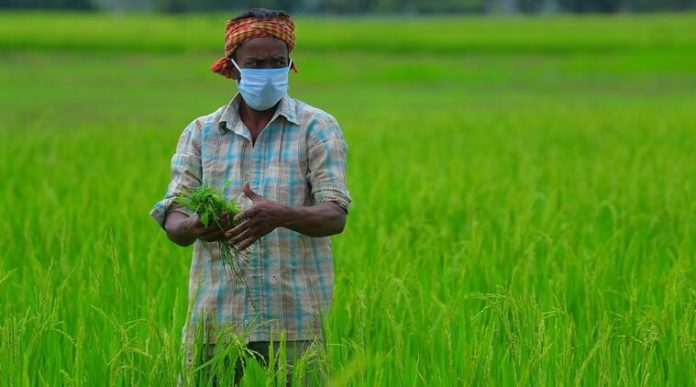This article is written by Pallavi Singh.
Introduction
Agriculture in India is an ancient occupation involving traditional methods of cultivation & for age’s farmers have been the backbone of the Indian agricultural system. From conserving their ancestral methods of agriculture in parallel to introducing new innovation by their own experiences and expertise, farmers in India have developed this sector to large extents. Very often we hear and see farmers from the interiors of the village coming up with new varieties of Plant, Fruits, or even preserving some of their ancient variety which is not known to the people outside their community. However, what we do not hear or know is that these varieties of the plant also form as an intellectual property of an individual farmer or a community and that s/he can under the provisions of IP law protect these new and ancient varieties and enjoy exclusive right over it for a certain period of time. This article aims to lay down certain rights and privileges that are available to Indian farmers over their innovative Plant Variety and how they can protect their IP under the UPOV Act.
India Adopted the Protection of Plant Variety and Farmers Rights Act (UPOV) in 2001 to comply with Article 27(3) (b) of the TRIPS Agreement which India is a signatory. The main aim of the act was to protect the rights of the farmers who are involved in breeding of new varieties of plants, or conserving a wild species or traditional varieties, or adding value to such wild species or traditional varieties through selection and identification of their useful properties.
Rights & benefit that are available to farmers under the UPOV Act
The UPOV act provides for some special rights and privileges for the farmers and the community who are indulged in preserving & protecting traditional plant variety & developing and breeding of a new or extended plant variety. To understand these rights and benefits, we need to first know how and why these rights were generated. Many new, traditional variety and wild races that exist in our country have various health and medicinal benefits which are known to the members of the local communities that are engaged in preserving the variety and utilizing it in their day-to-day lifestyle. However, as a consequence of globalization and with an exposure of communities to the outside world the problem of BioProspecting started to emerge which resulted in researchers and corporate institutes misappropriating the knowledge of the farmers and the community for their own benefit and excluding them from any kind of profit shares or royalties. Thus to safeguard such rights of the farmer/ the community, to avoid the misappropriation of the origin of the plants, and to get the farmers a fair share of their contributions the government had to introduce a class known as the Farmers Variety that grants the farmers a right to protect their innovation and traditionally preserved variety and help them commercially exploit it.
As per Section 2(l) farmer’s variety can be defined as a newly developed variety, wild relative, or landrace variety that is possessed by a farmer as a common knowledge, or a variety that has been cultivated traditionally by farmers on their fields. Whereas the wild race and traditional variety are possessed by the farmers as a result of being passed on to them by the past generation, a new farmers’ varieties are based on diverse sources, and build on landraces and local varieties from farmers. The rights and benefit that a farmer can avail under the UPOV act are as followed:
- Right to register their new variety
Under the UPOV act, the farmers have been granted the right to register their new variety of plant breeds developed on their field and avail all the other protection like any other breeder. For such a farmers variety to be registered a farmer has to furnish a declaration stating that the genetic or the parental material required for the development of the variety has been acquired by the farmer lawfully.
Apart from the declaration stated above for a farmer to be able to protect its plant variety under the UPOV Act, the variety must comply with the 3 test that is:
- Distinctiveness: when variety shows even one essential characteristic that can help distinguish it from the other known variety commonly available in the world at the time of application, it is said to be a distinct variety.
- Uniformity: when even on continuous propagation of the variety, the variety does not show sufficient uniformity in its essential characteristic it is said to be uniform.
- Stability: when the essential character remains the same even after repeated propagation it is said to be stable.
- Benefit for preserving wild variety and get award
When a farmer or a community is engaged in improvement and conservation of a Genetic resource or landrace and its wild relative by the means of selection and preservation such a farmer or the community shall be entitled to get recognition & reward from the National Gene Fund.
- Farmers to get compensations if an EDV does not perform properly
The UPOV act is determined to provide for the well-being of the farmers thus it provides for a provision wherein if a variety registered under this act is sold to a community or the farmers, the breeders of such a variety must disclose to the farmers the expected performance of the variety under a particular condition & if the variety fails to provide the promised results the farmers or the community can file a claim for compensation before the Plant Variety Authority, and the authority after giving the breeder an opportunity of being hard shall direct the breeders to pay such compensation as it deems fits.
- Right claim compensation for contribution
When a farmer, a community, an organization of farmers, or a village in India are involved in the developing and have substantially contributed in the development of an evolution of a plant variety that is been registered under this act, the farmers of the village has the right to claim for a stake in the benefit derived from the commercial exploitation of such variety. The main aim of including this provision is to prohibit the undue exploitation of farmers and the misappropriation of the genetic resources of a particular place by the hands of the corporate giants and research institutes. A BFA agreement can be concluded in 2 ways:
- By a mutual agreement between the corporate and research institute
Under this kind the farmers an organization or a representative of the village and the corporate body enter in a settlement, wherein in the farmer or the village community shall assist the research institute or the corporate bodies in the development and the production and testing of the new variety, in return for which they will be provided with a fixed percentage of the benefit that is generated from the commercial exploitation of the new variety.
- By filling a claim with the UPOV Authority
When no such settlement is been concluded among the parties, and their a contribution of the community or village in the development of the variety that is been registered under the Act, any person by representing the community or village can file a claim with centre notified Authority about the involvement & contribution of the community or the farmer in the evolution of such a variety.
Upon receipt of such a claim and the centre shall investigate its claim and report it to the Authority & after giving the breeder of the variety a reasonable opportunity to be heard, the Authority can ask the breeder to pay such compensation as it deems fit. Such compensation has to be deposited by the breeder in the National Gene Fund.
- Protect available for innocent infringement
Under the UPOV Act 2001, a person who sells, produces, imports, or exports a registered variety without the permission of the breeders has committed an act of infringement and is liable to pay damages or share benefits with the breeder. However if an offense of infringement is committed by a farmer, such a farmer will not be prosecuted for the infringement and shall not be liable to pay any damages to the breeder provided that at the time of the committing of the infringement the farmer was unaware of the rights of the breeder.
- Prior authorization for making an EDV from a farmers variety
An Essentially Derived Variety (EDV) is a new variety of plant that is derived from an initial variety, & is distinguishable for the initial variety possessing some essential characteristics/ features of the initial variety but also contains or shows some new features of its own. In a case where an individual is desirous of deriving or exploiting an EDV which is produced with the help of farmer variety, it is compulsory for such individuals to get the consent of the farmers or the community that is engaged in the production or preserving & development of such variety.
- Certain fee exemption
To ease the process for the farmers and to protect them from financial burdens the Farmer(s) are exempted from payment of any fee in any proceeding(s) that shall be conducted under this act before the Authority, Registrar, Tribunal, or even the High Court.
Conclusion
Many laws have been brought in place by the legislature to protect the rights of the farmers and promote more and more breeding, innovation, and preservation of plant varieties. Efforts are also made to protect the farmers from the exploitation of corporate or big research institutes and also to make sure that the farmers who have contributed to the development of a new variety get their fair share. Most of the process like of registration, tenure, and royalties are the same in both farmers variety and a normal variety, which serves as a concern since most of the farmers in the country are not well educated and would not be able to or be willing to go through the tedious process of the registration and various paper works. An easy and less wearisome process must be brought in place for the registration of a farmer’s variety so that more and more of them take initiative to register and preserve various varieties.
However it is one thing to formulate a law and another to implement it, if we see in reality many farmers are not aware of the rights and benefits that they can avail and enjoy over their innovations or production, to be specific the majority of the farmer and village population in India is illiterate. This in case provides for ample opportunities to the corporate sector to cheat and misuse the rights of the farmers. Efforts must be taken to let the farmer know and recognize their rights and effectively utilize and protect their IPs. Similarly, the authorities must also be regulating the agreements that have been mutually concluded between the farmers and the breeder and keep a check that they have been offered appropriate compensation against their contribution and are not deceived into settling at anything less than what they deserve.
LawSikho has created a telegram group for exchanging legal knowledge, referrals and various opportunities. You can click on this link and join:
 Serato DJ Crack 2025Serato DJ PRO Crack
Serato DJ Crack 2025Serato DJ PRO Crack











 Allow notifications
Allow notifications


